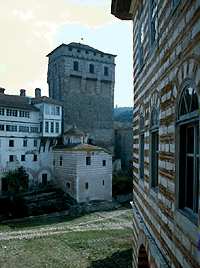|
|
 |
 |
 |
|
Tower
of Xilendar monastery, Mount Athos.
|
|
This story
illustrates all fundamental oppositions of Bulgarian culture, most Balkanic
cultures and a number of Mediterranean cultures. It treats the theme of
the youngest brother creating the event, opposed to the eldest one, who
lives a conformist life, according to a recurrent scheme in many European
societies : the brother who must avenge his sister's honor; the family
sanctuary tarnished by the suicide of the raped sister, making the duty
of revenge still more pressing; the fight against the barbaric Turk who
is so different from the familiar Moor of the western imaginary; the refuge
taken in the monastery; the function of refuge, of faith fortress, of centre
of diffusion of high culture exercised by the Sveta Gora, the Holy Montain.
All these elements together contribute to give "Petar's revenge", such as
it is related in Bansko in the Pirine, a double effect : to sacralize the
habitation where the initial drama took place by a narrativization of the
architectural programme about one of its most characteristic elements, the
tcherdak; to dramatize so much the life of Father Païsij that he appears
to Balkanic Slavs rather as a hero than a monk. So narrated, the father's
Vita is similar to that of St John of Rila, like the Vita of a fighter for
the greatness of Bulgarians is similar to that of a fighter for the greatness
of faith. But, since this popular hagiography is rather that of a hero than
of a saint, this Vita is to be compared with the legend relating the foundation
od the Church of the Trinity. Its form is more precisely that of a chanson
de geste, of one of these familial and ethnnic sagas (...) concerned with
family estate, tribal fight, blood vengeance, fraternal faithfullness, murder,
women, but treated in a most exaggerated manner. Will Païsij of Hilendar
(name of the Serb monastery on the Mount Athos where he lived till his death)
die and leave no trace of him in that unknown place, like another still
more legendary fighter, Marko, son of a king ? 
|



